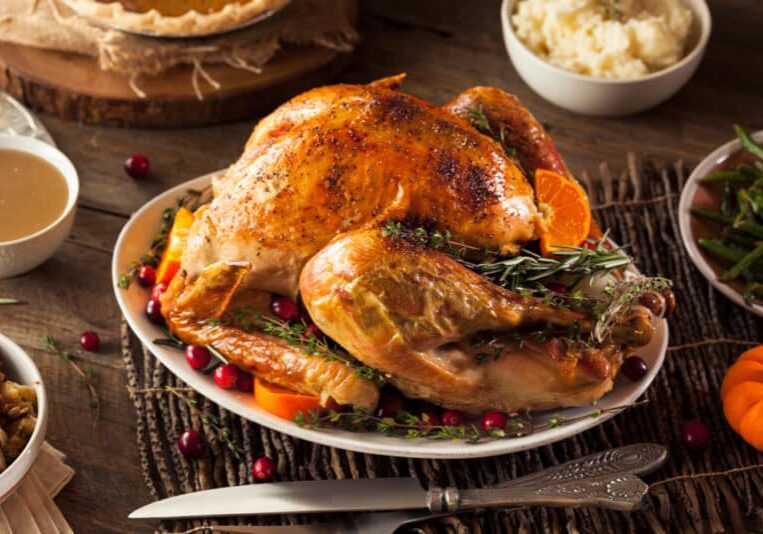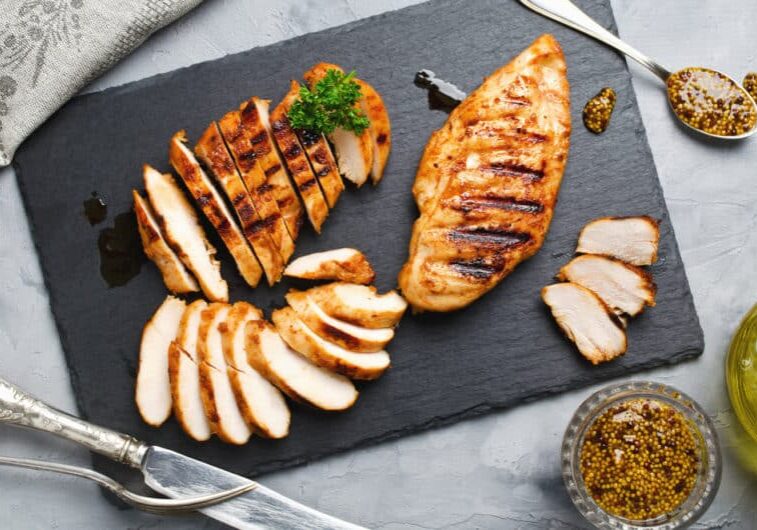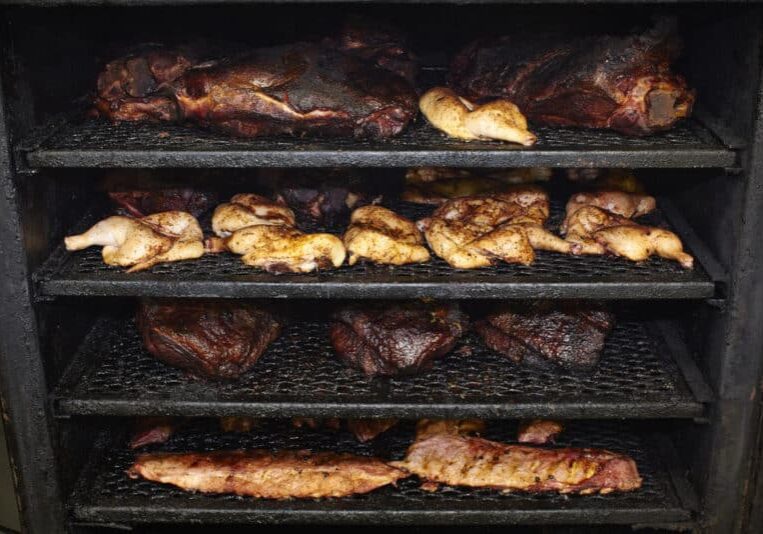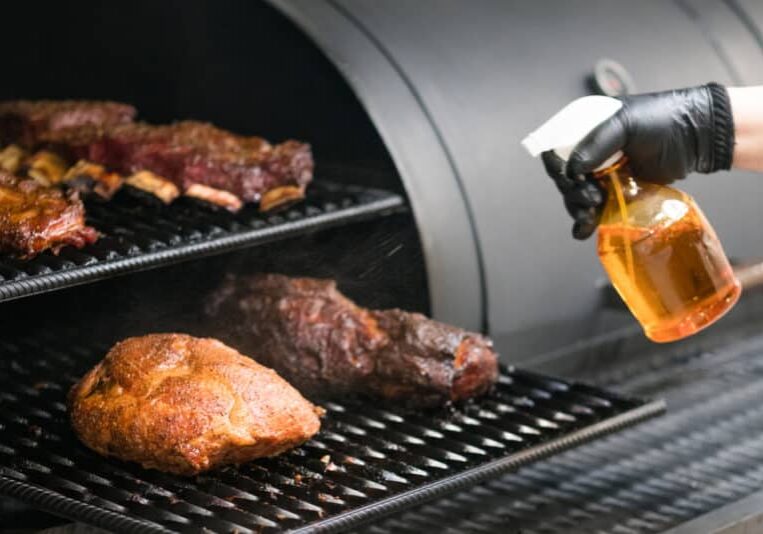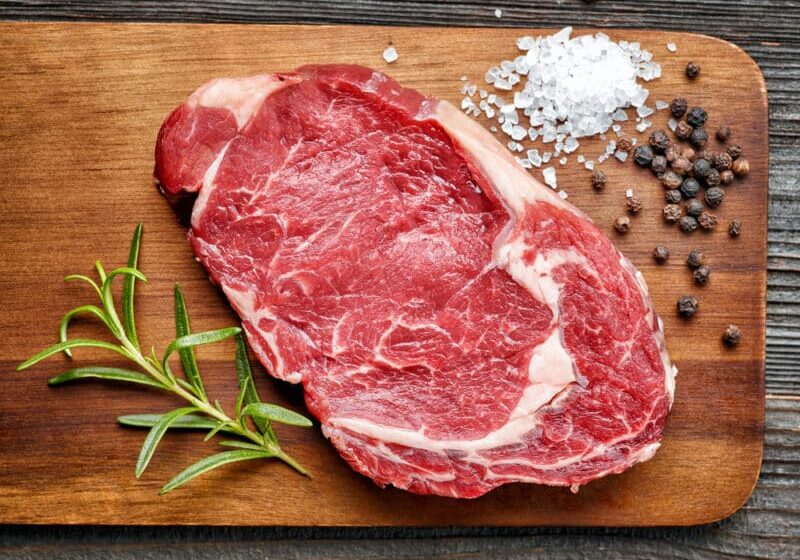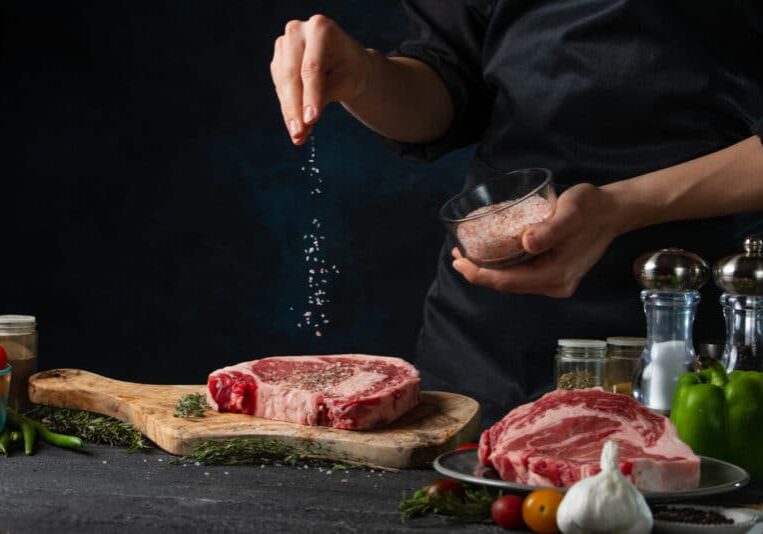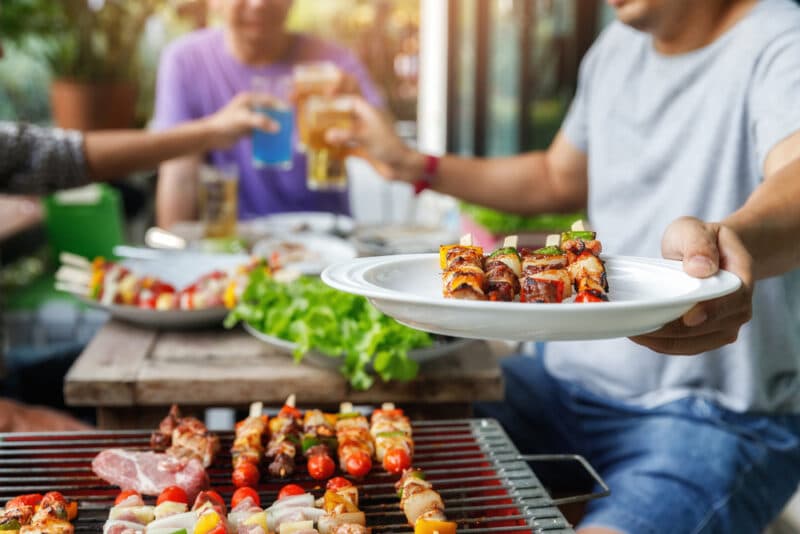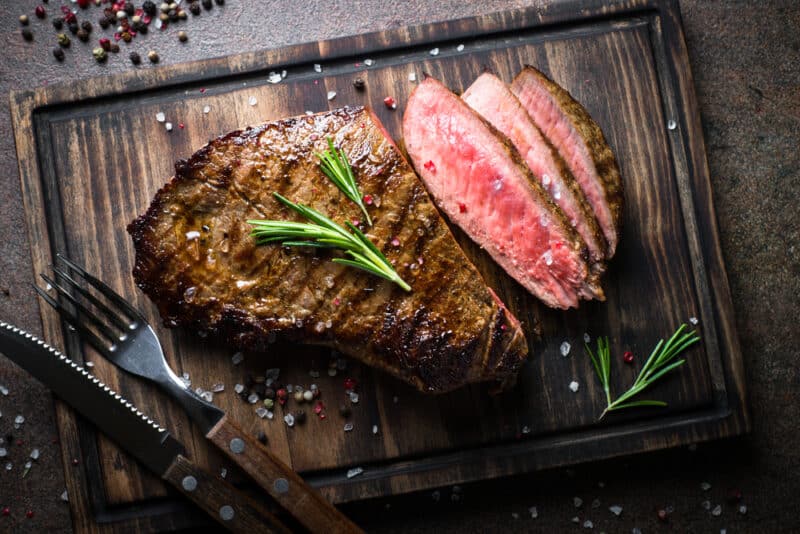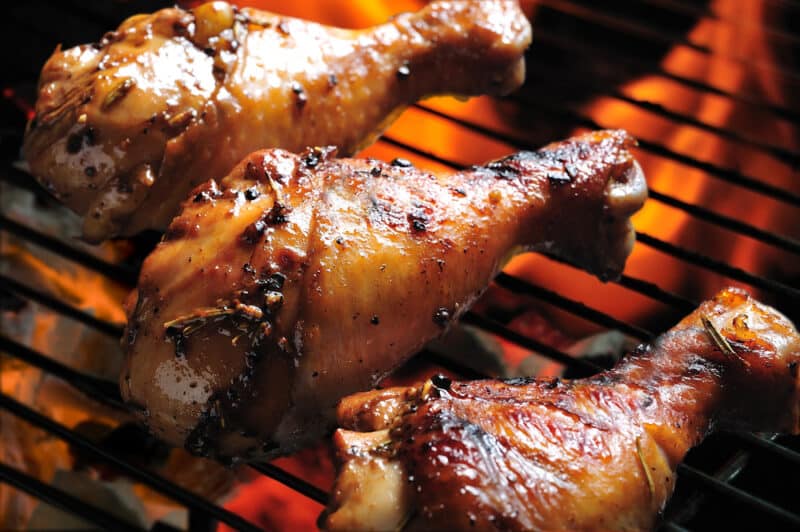Can You Use Charcoal in a Gas Grill? Exploring the Options
TheGrillingMaster.com is reader-supported. If you buy something using the links on our site, we might earn an affiliate commission at no added cost to you. This helps us pay our staff to keep making awesome content for you!
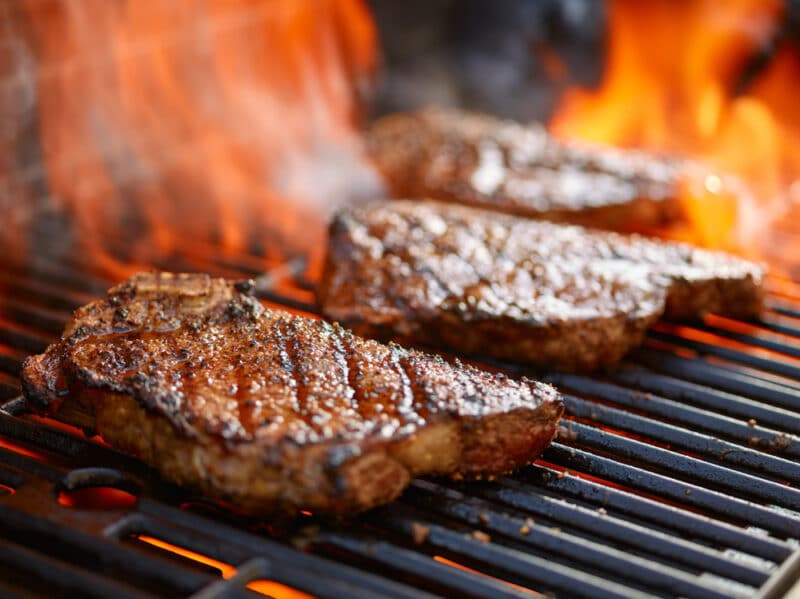
Are you struggling to achieve that authentic charcoal flavor on your gas grill? Well, I’ve been there too and did you know that using charcoal in a gas grill can actually damage the components? But don’t worry, I’ve done my research and found some great options to help enhance the flavor of your grilling experience. In this article, we’ll explore the dangers of using charcoal in a gas grill, as well as alternative solutions and tips for achieving that delicious smoky taste. Ready to step up your grilling game? Let’s dive in!
Key Takeaways
- Using charcoal in a gas grill can seriously damage its components and poses safety risks, such as flare-ups and carbon monoxide poisoning.
- Alternatives like hybrid grills or convertible models like the Char – Broil Gas2Coal offer the flexibility to use both charcoal and gas for varied flavor experiences without harming your equipment.
- Products like FlavrQ provide an easy way to achieve that smoky charcoal taste on a gas grill by using special trays to hold wood chips or lava coals while minimizing health risks.
- Creating high and low heat zones on your gas grill allows you to better control cooking temperatures and emulate the effect of a charcoal grill for enhanced flavors.
- Investing in grilling accessories, such as smoker boxes filled with wood chips or herbs, can further infuse grilled foods with aromatic smoky flavors typically associated with charcoal grilling.
Explanation of the topic
So, you’re curious if charcoal can mix with your gas grill for that smokey flavor we all love. Here’s the scoop: typically, these two don’t go together. Gas grills are designed for clean burning propane or natural gas, and adding charcoal could mess up their mechanics or be outright dangerous.
I’ve seen people tempted to try it out in pursuit of that classic barbecue taste but trust me, there’s more to consider before turning your gas grill into a coal pit.
Diving deeper, let’s break down what happens when you combine charcoal with a gas grill setup. Gas grills heat up quickly and offer easy temperature control—features not built for the slow burn of charcoal.
Using charcoal risks damaging vital parts of your grill, such as burners and ignition systems—not something you want to gamble with after spending good money on a quality product.
Plus, there’s safety to think about; clogged vents or flare-ups from improper use are real concerns when playing culinary chemist at home.
The Dangers of Using Charcoal in a Gas Grill
Using charcoal in a gas grill can potentially damage the grill’s components and lead to safety concerns. It’s important to understand the risks involved before attempting to use charcoal in a gas grill.
Potential damage to grill components
I found out the hard way that throwing charcoal into a gas grill can really mess up its parts. The intense heat from the coals can warp and damage the burner tubes and grates. It’s not just about getting them dirty; charcoal burns at a higher temperature than gas, which means it can weaken or even melt certain metals not meant to handle such heat.
And don’t get me started on the ash – it clogs up everything! My poor grill’s ignition system got so coated in ash and debris, sparking it up became a game of chance.
The aftermath wasn’t pretty either. Parts of my grill looked like they’d taken a beating after trying to burn off all that stuck-on residue. Cleaning turned into an epic chore, with hours spent scrubbing away when I’d rather be enjoying my BBQ time.
Trust me, swap out your gas for charcoal on one of these bad boys and you might end up with more than just smoky flavors – you could be looking at some serious repair bills or having to buy a whole new grill altogether!
Safety concerns
Safety concerns when using charcoal in a gas grill revolve around potential fire hazards. The combination of flammable gas and hot coals can pose a significant risk if not carefully monitored.
Additionally, improper use of charcoal in a gas grill may lead to carbon monoxide poisoning, as the ventilation system might not be suitable for charcoal combustion.
To mitigate safety risks, always follow manufacturer guidelines for your specific grill model and ensure proper airflow when using charcoal. Regularly inspect the grill for any signs of wear or damage that could compromise safety.
The Downfalls of Gas Grills
Gas grills can be expensive to operate, suffer from performance issues, and are difficult to clean. Additionally, they often waste fuel, making them less efficient than other grilling options.
Expense
Gas grills can be a significant investment, with prices ranging from $200 to over $2,000 for high-end models. In addition to the initial purchase cost, there are ongoing expenses such as propane or natural gas refills and maintenance.
The expense of running a gas grill can add up over time, making it important to consider the long-term costs when choosing between charcoal and gas grilling options.
Considering the ongoing expenses associated with using a gas grill, it’s essential to explore alternative options that may offer cost-saving benefits while still delivering delicious grilled flavors.
Performance issues
Gas grills may encounter performance issues like uneven heating, leading to inconsistent cooking results. Also, the flare-ups in gas grills can cause charring or burning of food and potentially damage the grill’s components over time.
Ensuring proper maintenance and cleaning can help mitigate these problems for a better grilling experience.
When using a gas grill, it’s essential to monitor the heat distribution and manage flare-ups effectively to avoid burnt or undercooked food. Regular upkeep and cleaning will help maintain the grill’s performance while preventing potential damage from occurring over time.
Cleanup difficulties
Cleanup after using a gas grill can be challenging, especially when dealing with grease and food residue. The grates and other components often require thorough cleaning to prevent flare-ups and maintain optimal performance.
Additionally, disposing of used charcoal or wood chips from smoker boxes can be messy if not handled properly. Proper maintenance is essential for ensuring the longevity of the grill and ensuring a safe cooking environment.
Cleaning up after grilling with gas can become time-consuming due to the accumulated grease and carbon residue on various parts of the grill. However, investing in specialized cleaning tools and following a regular maintenance schedule can significantly reduce cleanup difficulties associated with using a gas grill.
Wasting fuel
Using a gas grill can lead to wasting fuel, especially if it’s not properly maintained. Regularly cleaning the burners and ensuring they are free from debris will help maintain efficient fuel usage.
Additionally, adjusting the heat settings to fit the specific cooking needs can also prevent unnecessary waste of fuel.
To avoid wasting fuel, make sure to preheat the grill for an appropriate amount of time before cooking and keep the lid closed during grilling to retain heat and reduce energy consumption.
Introducing the FlavrQ Solution
I recently came across a game-changing product called FlavrQ that enhances the flavor of gas-grilled food. It’s an innovative solution for those looking to achieve the delicious taste of charcoal grilling on a gas grill.
Description of FlavrQ product
The FlavrQ product is a convenient and innovative solution for gas grill enthusiasts seeking to infuse their food with the delicious flavor of charcoal grilling. It consists of a specially designed charcoal tray accessory that allows you to place lava coals directly into your gas grill, providing an authentic smoky flavor to your grilled dishes.
This unique accessory gives you the flexibility to enjoy the convenience of a gas grill while achieving the unmistakable taste and aroma associated with traditional charcoal grilling.
With FlavrQ, you can effortlessly elevate your outdoor cooking experience by seamlessly incorporating the tantalizing essence of charcoal into your favorite BBQ meals.
Benefits of using FlavrQ
After learning about the innovative FlavrQ product, I couldn’t wait to experience the benefits. The first thing that stood out to me was how easy it is to create authentic charcoal flavor on my gas grill.
The unique design of FlavrQ allows for even heat distribution and smoke infusion, resulting in perfectly flavored grilled dishes every time. Additionally, using FlavrQ significantly reduces flare-ups and promotes a more consistent cooking temperature, ensuring juicy and flavorful results without any hassle or fuss.
Furthermore, I found that using FlavrQ makes grilling not only tastier but also healthier. By minimizing the formation of harmful compounds often associated with high-heat grilling, this accessory offers a healthier grilling alternative while still imparting that sought-after smoky flavor.
Alternatives to Using Charcoal in a Gas Grill
Consider using a hybrid grill or a convertible gas grill like Char-Broil Gas2Coal and Dyna-Glo Dual Fuel for the best of both worlds. With these options, you can enjoy the convenience of gas grilling while still achieving that classic charcoal flavor.
Using a Hybrid Grill
When using a hybrid grill, I can enjoy the convenience of gas grilling while still achieving the smoky flavor of charcoal. This type of grill allows me to use both gas and charcoal as fuel sources, offering versatility and flexibility in my grilling options.
By utilizing the gas component for quick, even heat distribution and incorporating charcoal for added flavor infusion, I can create delicious grilled dishes with authentic smoky notes.
With a hybrid grill, I have the ability to experiment with different cooking methods and techniques, such as direct grilling over high heat or indirect smoking over low heat. This provides me with greater control over the cooking process, allowing me to achieve the desired level of charred flavor and tenderness in my favorite grilled foods.
Convertible gas grills like Char-Broil Gas2Coal and Dyna-Glo Dual Fuel
Convertible gas grills such as Char-Broil Gas2Coal and Dyna-Glo Dual Fuel are versatile options for those who want the convenience of gas grilling while also having the ability to use charcoal when desired.
These grills offer a seamless transition from gas to charcoal, allowing users to enjoy the benefits of both fuel sources without needing separate grills. With adjustable trays or dedicated burners for each fuel type, these convertible models provide flexibility for various cooking styles and flavor preferences.
These adaptable grills cater to diverse grilling needs, making them suitable for different occasions and culinary experiments. Convertible gas grills like Char-Broil Gas2Coal and Dyna-Glo Dual Fuel expand the possibilities of outdoor cooking by offering dual fuel options in one convenient package.
How to Achieve Charcoal Flavor on a Gas Grill
Achieving that classic charcoal flavor on a gas grill is possible by using grilling techniques such as creating high and low heat zones, and utilizing specific grilling accessories.
With the right approach, you can still enjoy the taste of charcoal-grilled food even on a gas grill.
Tips for achieving charcoal flavor on a gas grill
To achieve a charcoal flavor on a gas grill, I use grilling accessories like smoker boxes or wood chips to infuse the food with smoky essence. Creating high and low heat zones on the grill allows for better control over cooking temperatures, resulting in delicious, charred flavors.
Another technique is to preheat the gas grill and allow the grates to become very hot before placing the food for searing, mimicking the effect of a charcoal grill. By combining these methods, I can enjoy the distinctive taste of charcoal-grilled food while using my gas grill.
Additionally – Wasting fuel by running it at unnecessary high temperatures should be avoided when trying to achieve authentic charcoal flavor on a gas grill. By adjusting burners according to need instead of simply turning all burners up high, you save fuel and control temperature more effectively ensuring efficient cooking.
Using high and low heat zones
To maximize the versatility of your gas grill, utilizing high and low heat zones is essential. Creating distinct temperature zones on the grill allows for better control over cooking different types of food simultaneously.
By adjusting the burners, you can designate one area for searing meats at a high heat while maintaining another section at a lower temperature for delicate foods or longer cooking times.
Managing high and low heat zones also ensures that food is cooked evenly and prevents flare-ups caused by dripping fat. It’s an effective way to achieve optimal flavor development without overcooking or undercooking your dishes.
Conclusion
In conclusion, there are several options to achieve a charcoal flavor on a gas grill, including using hybrid grills or adding products like FlavrQ. I encourage you to explore these alternatives for a better grilling experience.
Summary of key points
The dangers of using charcoal in a gas grill should not be overlooked. Potential damage to grill components and safety concerns are valid reasons to avoid this practice. However, there are alternatives available for achieving that classic charcoal flavor on a gas grill.
Hybrid grills and Convertible gas grills like Char-Broil Gas2Coal and Dyna-Glo Dual Fuel offer the flexibility of both gas and charcoal grilling, providing flavorful options without compromising on safety or performance.
Additionally, tips for achieving that smoky charcoal flavor on a gas grill include utilizing high and low heat zones effectively, ensuring an enjoyable BBQ experience without the drawbacks of traditional gas or charcoal grills.
The FlavrQ solution introduces a product designed explicitly for enhancing the flavors of gas-grilled food with its Fake Charcoal addition. This innovative offering allows users to infuse their grilled dishes with deliciously authentic flavors reminiscent of traditional charcoal grilling without sacrificing convenience or safety.
Encouragement to try alternative options for a better grilling experience
I encourage trying alternative grilling options for a more flavorful experience. Experimenting with hybrid grills or using gas smokers can help achieve the desired charcoal flavor while enjoying the convenience of a gas grill.
By exploring these alternatives, individuals can unlock new ways to enhance their grilling without compromising on taste or convenience. Whether it’s using a hybrid grill that allows for both gas and charcoal cooking or incorporating a gas smoker into the grilling routine, there are various ways to infuse that authentic charcoal flavor into your food.
In my opinion, embracing versatility in grilling options opens up endless possibilities and lets you enjoy the best of both worlds when it comes to flavor and convenience. Switching things up and giving these alternatives a try could lead to an even better grilling experience, making every BBQ gathering more memorable and enjoyable.
FAQs
1. Can I put charcoal on a gas grill to get that smoky flavor?
Using charcoal in your gas grill isn’t recommended because it’s designed for the cleaner burning of gas, but if you want that smoky charcoal flavor, there are hybrid grills specifically made for both types of fuel.
2. Are there any grills that can use both gas and charcoal?
Yes, hybrid grilling is possible with special BBQ grills designed to work safely with both gas and charcoal, giving you flavorful grilling options.
3. How do I add the taste of charcoal when using a gas grill?
To infuse your food with the taste of charcoal while using a gas grill, you can try adding wood chips or smoker boxes that give off a similar smoky flavor without using actual charcoal.
4. What’s the best way to enjoy flavorful meat from my usual BBQ grill?
For the most flavorful grilling experience on your regular BBQ grill, consider marinating your meats longer and using savory rubs or experimenting with different kinds of smoking woods to enhance the taste.
Learn More About Grilling
If you want to learn more about grilling, check out these other helpful resources!

Kevin Turner
Hi there, I'm Kevin Turner, Founder and CEO of thegrillingmaster.com. I started this website to share my passion and knowledge with you. You can leverage my years of experience as a pit master and professional to grill great food!
About The Grilling Master
Hi there, I'm Kevin Turner, Founder and CEO of thegrillingmaster.com.
My passion has always been grilling, smoking and BBQ delicious meats that satisfy my inner carnivore!
I started this website to share my passion and knowledge with you, the hungry reader who wants to prepare the perfect meal.
You can leverage my years of experience as a pit master and professional.
Send me a message and let's connect on Twitter here.


